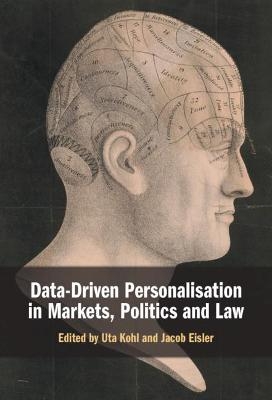
Data-Driven Personalisation in Markets, Politics and Law
Cambridge University Press (Verlag)
978-1-108-83569-5 (ISBN)
The most fascinating and profitable subject of predictive algorithms is the human actor. Analysing big data through learning algorithms to predict and pre-empt individual decisions gives a powerful tool to corporations, political parties and the state. Algorithmic analysis of digital footprints, as an omnipresent form of surveillance, has already been used in diverse contexts: behavioural advertising, personalised pricing, political micro-targeting, precision medicine, and predictive policing and prison sentencing. This volume brings together experts to offer philosophical, sociological, and legal perspectives on these personalised data practices. It explores common themes such as choice, personal autonomy, equality, privacy, and corporate and governmental efficiency against the normative frameworks of the market, democracy and the rule of law. By offering these insights, this collection on data-driven personalisation seeks to stimulate an interdisciplinary debate on one of the most pervasive, transformative, and insidious socio-technical developments of our time.
Uta Kohl is Professor of Commercial Law at Southampton Law School. Her previous work on IT law issues includes Jurisdiction and the Internet (Cambridge, 2007) and The Net and the Nation State (Cambridge, 2016). She acted as the Human Rights Trustee on the board of the Internet Watch Foundation (2014–2020) and is currently exploring the legal treatment of memories, funded by a Leverhulme grant on the Privacy of the Dead. Jacob Eisler is Associate Professor at Southampton Law School where he focuses on democratic theory, election law, and corruption. Prior to joining Southampton Law School, he was the Yates-Glazebrook Fellow in Law at Jesus College, University of Cambridge. and clerked for the Honorable Gerard E. Lynch, Federal Second Circuit Court of Appeals.
Part I. Introduction: Theoretical Perspectives; 1. The Pixelated Person – Humanity in the Grip of Algorithmic Personalisation Uta Kohl; 2. Personalisation and Digital Modernity: Deconstructing the Myths of the Subjunctive World Kieron O'Hara; 3. Personalisation, Power and the Datafied Subject Marc Welsh; 4. Personal Data and Collective Value: Data-Driven Personalisation as Network Effect Nick O'Donovan; Part II. Themes: Personal Autonomy, Market Choices and the Presumption of Innocence; 5. Hidden Personal Insights and Entangled in the Algorithmic Model – the Limits of the GDPR in the Personalisation Context Michèle Finck; 6. Personalisation, Markets, and Contract: The Limits of Legal Incrementalism T.T. Arvind; 7. 'All Data is Credit Data' – Personalised Consumer Credit Score and Anti-Discrimination Law Noelia Collado-Rogriguez and Uta Kohl; 8. Sentencing Dangerous Offenders in the Era of Predictive Technologies: New Skin, Same Old Snake? David Gurnham; Part III. Applications: From Personalised Medicine and Pricing to Political Micro-Targeting; 9. 'P4 Medicine' and the Purview of Health Law: The Patient or the Public? Keith Syrett; 10. Personalised Pricing: The Demise of the Fixed Price? Joost Poort and Frederik Zuiderveen Borgesius; 11. Data-Driven Algorithms in Criminal Justice: Predictions as Self-Fulfilling Prophecies Pamela Ugwudike; 12. From Global Village to Smart City: Reputation, Recognition, Personalisation, and Ubiquity Daithí Mac Sithigh; 13. Micro-Targeting in Political Campaigns: Political Promise and Democratic Risk Normann Witzleb and Moira Paterson; Part IV. The Future of Personalisation: Algorithmic Foretelling and Its Limits; 14. Regulating Algorithmic Assemblages: Looking Beyond Corporatist AI Ethics Andrew Charlesworth; 15. Scepticism about Big Data's Predictive Power about Human Behaviour: Making a Case for Theory and Simplicity Konstantinos Katsikopoulos; 16. Building Personalisation: Language and the Law Alun Gibbs; 17. Conclusion: Balancing Data-Driven Personalisation and Law as Social Systems Jacob Eisler.
| Erscheinungsdatum | 19.07.2021 |
|---|---|
| Zusatzinfo | Worked examples or Exercises |
| Verlagsort | Cambridge |
| Sprache | englisch |
| Maße | 158 x 235 mm |
| Gewicht | 620 g |
| Themenwelt | Schulbuch / Wörterbuch |
| Recht / Steuern ► EU / Internationales Recht | |
| Recht / Steuern ► Privatrecht / Bürgerliches Recht ► IT-Recht | |
| ISBN-10 | 1-108-83569-4 / 1108835694 |
| ISBN-13 | 978-1-108-83569-5 / 9781108835695 |
| Zustand | Neuware |
| Informationen gemäß Produktsicherheitsverordnung (GPSR) | |
| Haben Sie eine Frage zum Produkt? |
aus dem Bereich


